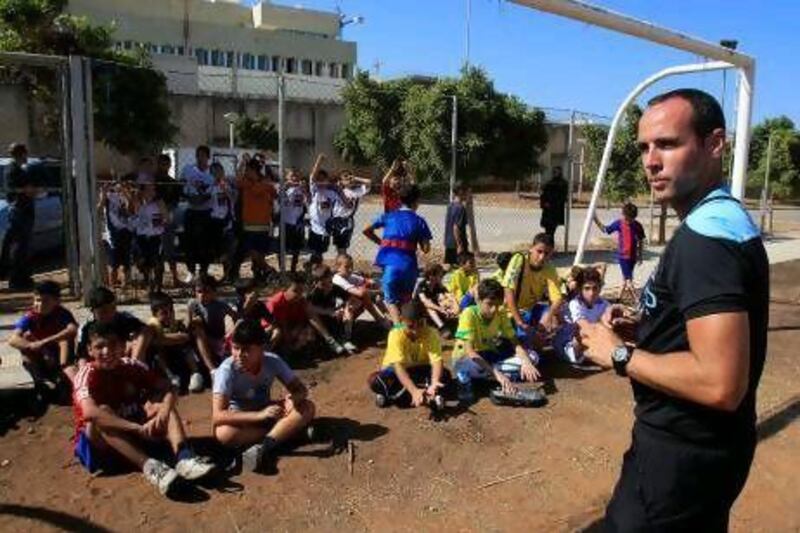Her life in an overcrowded Palestinian refugee camp is beset by street fights, power cuts and grinding poverty, but for a few days last week 11-year-old Rayan enjoyed star treatment - on the football pitch with an academy coach from Manchester City, the English Premier League club.
"When I play football, I forget all about my problems," Rayan said with a smile before hitting the dusty pitch on the outskirts of Beirut where Alan Dixon of the Manchester City Football Academy was running training sessions.
Rayan is one of some 200 footballers aged between six and 17 who attended the four-day camp Dixon hosted for Palestinian and Lebanese children, who not only learnt new techniques in the world's favourite sport but relished a rare chance to have some fun.
"In Burj Al Barajneh camp, there are many street fights, and electricity gets cut off all the time," said Rayan.
Some 280,000 Palestinian refugees live in Lebanon, according to the UN Relief and Works Agency in Lebanon (UNRWA), and most grow up living in one of 12 official camps and 42 gatherings scattered across the country.
For many of those living in the squalid camps and gatherings life is a daily struggle, and for children, there is barely space to play.
But those are not Rayan's only problems. "Some people say us girls shouldn't be playing football at all. But we don't care," she said, adding that football helps her stop thinking about problems and to focus on her passion.
And even if some people in the community tell them not to play with Lebanese children, they will not listen.
"Football is for everyone. That's the thing I love the most," said Rayan.
Under the beating sun, boys and girls worked in groups on special exercises designed to improve their dribbling and passing skills before playing a match.
They were also taught to hold their heads up high while playing so they can keep an eye on the field, and to think and communicate quickly while playing.
"What has impressed me is that I've seen some really good football over the past few days," said Dixon, a former Oldham Athletic defender, who believes the children have learnt much more than only new football techniques.
"You learn a lot of life skills through football. You are part of a team, and you have to deal with many different people.
"You need to communicate."
Dixon also believes football helps children develop a sense of trust, which is often lacking in those growing up in marginal, stressful situations.
"Palestine refugees in Lebanon do not enjoy several basic human rights," according to UNRWA, which has teamed up with Manchester City for the football training.
Systematically marginalised in the small Mediterranean country, Palestinians "experience great hardship and poverty in their daily lives," said the agency in a statement on its website.
"The camps force stress on people, many of whom live in overcrowded houses," said Hoda El Turk, the communication officer for UNRWA.
"With no spaces for recreational activity, children have no way to deal with the stress of their environment."
Guy Al Haj, a Lebanese player who was coaching the children alongside Dixon, said the children play well partly because of the difficulties they face in their daily lives.
"They have no fear, they play hard, they throw themselves on the ground, and do whatever it takes to improve," he said. "Think about it. Most professional football stars come from disadvantaged backgrounds."
Although the activity lasted just a few days, for the children it was "a dream come true," said Iman Omaiss, mother of three young footballers aged 14, 12 and 10, who arrived at the field dressed in bright yellow Brazil T-shirts.
Omaiss and her family are Lebanese although most of the children taking part are of Palestinian background.
"I've been looking forward to this training for months," said her 12-year-old son Hussein. "We've learnt how to play better and we've had fun, but also how to accept defeat. I can't wait until school starts now, so I can tell my friends."
Older teenagers also joined the sessions, getting relief from the hard work they do to survive in expensive Lebanon.
"I left school a couple of years ago," said 17-year-old Ibrahim, who sported a Real Madrid T-shirt and played in flip-flops - as did some of the others attending the training.
"I work in an aluminium factory now, and when I get home from work, I'm exhausted," said Ibrahim, who looked strikingly similar to Portuguese star Cristiano Ronaldo, and is from Burj Al Barajneh.
Despite his weariness, he said he always went out immediately to play football, which for him and his friends is an escape from a daily routine of work and stress.
"I don't look for fights, but sometimes, you get dragged in," said Ibrahim. "Personally, I'd rather not fight at all. I'd rather just play."
Follow us
[ @SprtNationalUAE ]





